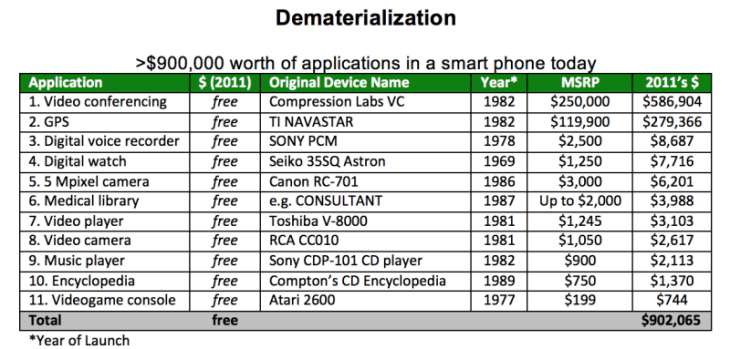Robots may take our jobs, but everything will be cheaper in the future

This week, Finland embarked on an ambitious social experiment - giving its citizens a guaranteed income. Granted, Finland's attempt is only an experiment, and is limited to a very small section of its unemployed citizens (2,500 randomly selected people on benefits). Even so, it's the latest in a number of global experiments with universal basic income.
Even 10 years ago, the concept of a universal basic income was treated as laughable. Now, with advances in robotics and AI taking over jobs and threatening to drastically reshape the world as we know it, a guaranteed basic income now sounds a lot more plausible. After all, with a growing population and a shrinking job market, how does one earn enough to survive?
Government's worldwide are still following a 'money makes the world go round' approach in their attempts to plan for a robot-powered economy. Dr. Peter Diamandis though, sees a different future. One where robots make the world go round and money...well, money isn't very necessary.
Technological socialism and kicks for free
Diamandis, a futurist who's been named one of the 'World's 50 Greatest Leaders' by Forbes, has put forth a vision of a future world where technology effectively brings our cost of living down to zero. Or close to it, any way.
His theory, while radical, is actually based on some fairly simple facts and observations.
Firstly, Diamandis has whittled the majority of global consumer expenditure down to 7 key categories - transportation, food, healthcare, housing, energy, education and entertainment (in no particular order). While the degree of spending on any of these categories may vary from country to country, it is fairly reasonable to agree that these are, indeed, the major avenues of consumer spending.
Focussing on just these categories, Diamandis goes on to explain that, through technology, the cost of each of these, is going to shrink drastically in next 20 years. This is what Diamandis refers to 'demonetisation' and, as he points out, there are plenty of precedents.
In his book Abundance, he offers this 1986-2011 comparison as an example of how just today'ssmartphone has demonetised a lot of technology:

All of the things listed in the above chart were a luxury that could be afforded to only the wealthiest. Today, they are accessible to people from every socio-economic class, Freeom 251 notwithstanding. To use Diamandis' words, it's technological socialism.
A cheaper future
But the good doctor doesn't just stop there. He has actually envisioned how the 7 consumer expenditure categories will be transformed in the future. And, before you go dismissing his vision as the ramblings of a sci-fi fan, consider the man's CV:
He's co-founder of XPRIZE, an organisation that fundss and organises competitions for technology that could benefit mankind. He's co-founder of space exploration company Planetary Resources. He also co-founded Human Longevity Inc. to try and extend human lifespans. He's part of even more exciting projects, we're just not sure we have he time to list them all. Though, Human Longevity Inc. intends to change that.

Here's what Diamandis sees happening to the major areas of consumer expenditure:
1) Transport
The automobile industry is absolutely gargantuan, valued in the trillions. But Diamandis already sees it being demonetised. Uber, according to him, is a prime example of this.
Currently, Uber's largest operational cost (and liability) is the human element - the driver. Once self-driving cars become the norm, this goes out the window, sending transport costs crashing. When one factors in insurance, parking costs, maintenance, fuel and the like, taking an Uber will be far cheaper than owning a car in this new transport paradigm.
As Diamandis says, "Ultimately, the poorest people on Earth will be chauffeured around."
2) Food
You've already seen the cost of food come down over your lifetime. While inflation may make it seem like these prices are rising, technological and scientific advancements mean we're able to produce more food than ever before. And much, much cheaper too.
We haven't even reached our peak capacity though. Recent advancement's like Japanese company SPREAD's robotic-farming venture show that we can use more tech and less space to produce an exponentially greater quantity of food.
3) Healthcare
Based on where you live, healthcare can be one of the most daunting expenses you face. Currently, the thought of illness or injury strikes fear into the hearts of people, not so much because of the blow to the body, but to the wallet. Technology though, is already changing this.
Advanced AI today is already capable of detecting cancer, sometimes even better than highly skilled doctors. Moving forward we'll see these diagnostic capabilities ramped up, bringing the cost of diagnostics down drastically.
Robotic surgeons are already being tried out and could be a norm, with human surgeons moving into supervisory capacities and possibly even being phased out.
Diamandis also believes that medicines will, not only be more efficiently discovered by AI, but could even be custom 3D printed at home to suit individual patients in the future.
4) Housing
The primary driver for the cost of real estate is location. People want to live in places that are accessible and provide greater accessibility to work and entertainment. However, this need to live close to our place of work will as transport moves to the Uber paradigm envisioned by Diamandis. Who cares about an hour-long commute when you can sit back and nap or watch something?
Heck, the need for commuting may disappear altogether. Your workspace could become a virtual one where you plug in from the comfort of your own house.
All of this coupled with 3D printed housing should bring the cost of housing down manifold and even help spread the population out slightly more to overcome congestion.

5) Energy
Fossil fuels are on their way out and renewables are clearly the way forward. Already, entire countries are being run on renewable energy, and moving forward, we're going to see way more of this. Eventually, energy won't be a privilege but a birthright.
6) Education
One of the largest causes of inequality in the world is access to education. The richer you are, the better your education. But this wont be the case in the future. In fact, it's already changing.
The internet has already played the role of the great leveller, making information accessible to the masses. Places of higher education too are starting to offer courses for free online.
One of the major reasons higher education is as expensive as it is, professors, may soon be replaced with AI. In fact, just this past year, an AI teaching assistant was trialled with students unable to tell the difference.
7) Entertainment
Think of how much you once paid to rent a single VCD or DVD. Now think about how much a service like Netflix - which offers you years worth of content - costs you. Moving forward, these sort of things are only set to get cheaper.Virtual reality will also mean that you can get all the thrills of various forms of entertainment, while sitting at home, effectively making them all free.
First published: 31 August 2016, 11:26 IST






![BJP's Kapil Mishra recreates Shankar Mahadevan’s ‘Breathless’ song to highlight Delhi pollution [WATCH] BJP's Kapil Mishra recreates Shankar Mahadevan’s ‘Breathless’ song to highlight Delhi pollution [WATCH]](https://images.catchnews.com/upload/2022/11/03/kapil-mishra_240884_300x172.png)

![Anupam Kher shares pictures of his toned body on 67th birthday [MUST SEE] Anupam Kher shares pictures of his toned body on 67th birthday [MUST SEE]](https://images.catchnews.com/upload/2022/03/07/Anupam_kher_231145_300x172.jpg)



_in_Assams_Dibrugarh_(Photo_257977_1600x1200.jpg)


